| Srl | Item |
| 1 |
ID:
118580
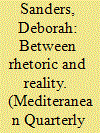

|
|
|
|
|
| Publication |
2012.
|
| Summary/Abstract |
As a powerful littoral state with important security interests in the Black Sea, Russia has the ability to use the maritime domain to advance and protect its interests, which will affect regional and international security. Using the currently available literature, this essay examines the three factors that shape and affect Russia's maritime power in the Black Sea: quantitative factors such as the number and capability of maritime platforms as well as access to maritime infrastructure; qualitative factors such as the morale of maritime personnel; and the strategic context in which Russia exercises its maritime power. It argues that Russian maritime power is likely to decline significantly. Not only will Russia have significantly fewer maritime platforms in the future, but its ability to use the maritime domain will be compromised by qualitative problems and poor relations with the United States and littoral states such as Georgia and Romania.
|
|
|
|
|
|
|
|
|
|
|
|
|
|
|
|
| 2 |
ID:
138705
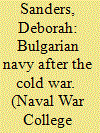

|
|
|
|
|
| Summary/Abstract |
This article examines the Bulgarian government’s struggle to modernize its navy since the end of the Cold War. Although the Bulgarian navy is small, it is an important navy and an interesting case study, for two reasons: it plays an important role in protecting and advancing Bulgaria’s interests in the maritime domain, and it operates in an increasingly challenging maritime nvironment. Situated in the southeastern part of the Balkan Peninsula on the Black Sea, on
which it has a long coastline, Bulgaria has important economic and security interests in the maritime domain, and its navy has a significant part to play in protecting these interests. Bulgaria’s Black Sea ports of Varna and Bourgas are the gateways of 60 percent of the nation’s foreign trade and are vital to its economy. Bulgaria has also become one of the leading tourist destinations in Europe.
|
|
|
|
|
|
|
|
|
|
|
|
|
|
|
|
| 3 |
ID:
092901
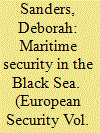

|
|
|
|
|
| Publication |
2009.
|
| Summary/Abstract |
The Black Sea is bordered by three NATO members: Bulgaria, Romania and Turkey, as well as Ukraine, Russia and Georgia and it faces a number of maritime security threats that affect European security. These include direct threats to ships, shipping and maritime personnel as well as threats from the way in which the Black Sea is used for illegal activities by criminals and terrorists. This paper argues that despite the acceptance by NATO that regional maritime security operation performed by littoral states will provide a safe and secure maritime environment in the Black Sea, these serious maritime threats cannot be dealt with effectively by the littoral states. Poor relations between littoral states and lack of investment in maritime capabilities suggest that maritime security cannot be achieved in the Black Sea in the short to medium term. Instead, Black Sea will continue to be a major source of insecurity and instability for Europe.
|
|
|
|
|
|
|
|
|
|
|
|
|
|
|
|
| 4 |
ID:
154889
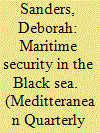

|
|
|
|
|
| Summary/Abstract |
Traditional maritime security challenges have returned to the Black Sea, and this has had a negative effect on the ability of the six littoral states to address newer security challenges. Traditional maritime security challenges include the buildup of Russian forces in Crimea, the return of conflict to the shores of the Black Sea, uncertainty over the demarcation of maritime borders, and strained relations between Turkey and Russia. As a result, newer and no less important maritime security challenges have, in effect, been pushed off the agenda.
|
|
|
|
|
|
|
|
|
|
|
|
|
|
|
|
| 5 |
ID:
159113


|
|
|
|
|
| Summary/Abstract |
Russia’s seizure of many of Ukraine’s naval assets dealt a serious blow to the already-small Ukrainian
navy. The Ukrainian government’s ambitions to rebuild a balanced fleet may be unrealizable.
The progress already made in building a “mosquito fleet” suggests that redirecting development
toward coastal defense would be a wiser course.
|
|
|
|
|
|
|
|
|
|
|
|
|
|
|
|
| 6 |
ID:
079725


|
|
|
|
|
| Publication |
2007.
|
| Summary/Abstract |
Since the 'Orange Revolution' Ukraine has been engaged in a comprehensive programme of naval transformation aimed at building an effective coastal defence navy able to protect its maritime interests in the Black Sea: an efficient and well run Ukrainian coastal navy that is inherently defensive in orientation can maintain good order at sea and protect Ukraine's security and can also make an important contribution to regional security and stability. Over the last few years Ukraine has been making steady progress in developing a balanced, flexible and deployable coastal navy able to engage in a full spectrum of defence activities. However, continued progress is likely to be hampered in the medium term by the high cost of naval transformation, the challenges of democratic consolidation and friction between Russia and Ukraine in the Black Sea
|
|
|
|
|
|
|
|
|
|
|
|
|
|
|
|
| 7 |
ID:
171679


|
|
|
|
|
| Summary/Abstract |
The war in the east of Ukraine is now in its sixth year, and despite the cost-benefit logic for both sides of securing a peace, the chances of terminating this conflict remain remote. Using the theoretical literature on war termination, this article demonstrates that the problems of resolving the conflict in the Donbas lie in complex structural issues that are not easy to resolve. To make this argument, this article examines the problems of bringing the conflict to an end by framing the problems according to four key questions: Is war working for the belligerents; Is there a peace to be made; Is peace too costly; Can the war be stopped?
|
|
|
|
|
|
|
|
|
|
|
|
|
|
|
|
| 8 |
ID:
192613


|
|
|
|
|
| Summary/Abstract |
This article explores an important and often overlooked element of Ukraine’s ability to defend itself against the Russian invasion in February 2022 – the adoption of a modified western transformational model of military reform – which has focused on mass and building a western style NATO interoperable and trained military. This article argues that Ukraine’s military reform since 2016, in particular the focus on Command and Control, the development of an NCO Corps and Special Forces as well as clear procurement priorities have created the enabling conditions for the development of a flexible and adaptable military force, able to limit Russia’s battlefield success and bring the fight to the enemy. Despite this progress, however, a recurring problem facing the Ukrainian military, that is likely to continue in the future, is how to balance the ongoing requirement for mass against the urgent need for military modernisation.
|
|
|
|
|
|
|
|
|
|
|
|
|
|
|
|
| 9 |
ID:
110884


|
|
|
|
|
| Publication |
2012.
|
| Summary/Abstract |
This article examines why Ukraine has struggled to build an effective and efficient coastal navy able to protect and advance its interests in the Black Sea and beyond. Using the literature on maritime power the argument explores how Ukraine's ability to use the sea has declined significantly over the last five years. It argues that chronic under-funding of Ukraine's ambitious military transformation, recent decisions taken by the government to extend the Russian lease of Sevastopol and to declare its non-aligned status, and ongoing domestic political instability have all damaged Ukraine's maritime power.
|
|
|
|
|
|
|
|
|
|
|
|
|
|
|
|
| 10 |
ID:
085238


|
|
|
|
|
| Publication |
2008.
|
| Summary/Abstract |
This article examines Ukraine's radical plans to reform its military over the next three years and argues that the model adopted is based largely on the dominant US paradigm of what constitutes an efficient and effective military in the twenty first century. Ukraine faces two challenges in building a paradigm army: the high cost of reform and the unstable political context within which reform takes place. The lack of funding and political support for military reform has impacted negatively on the operational effectiveness of Ukraine's military and is likely to hamper retention and recruitment of quality personnel in the future.
|
|
|
|
|
|
|
|
|
|
|
|
|
|
|
|
| 11 |
ID:
078828
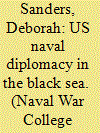

|
|
|
| 12 |
ID:
152222


|
|
|
|
|
| Summary/Abstract |
This article examines the military change that has taken place in Ukraine since the conflict in the east began in 2014 and argues that the Ukrainian military that is emerging from this process is very different from that envisaged by earlier governments. The realities of the conflict on Ukraine from 2014 onwards have necessitated a move away from the transformational model of military reform adopted from 2006 to 2014. Instead, the Ukrainian Armed Forces (UAF) have been forced to adapt their structure, means, and methods according to a complex blend of the resuscitation of older features and the embrace of new solutions. This process notably has included the adoption of mass, crowdfunding, and the raising of volunteer battalions. These changes provide the foundation for what is likely to continue to be a painful process of far-reaching military reform.
|
|
|
|
|
|
|
|
|
|
|
|
|
|
|
|